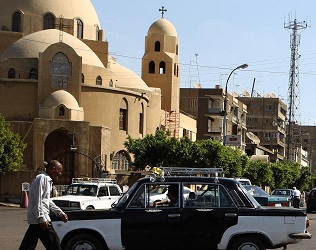CAIRO: Girgis Farag Nasr closed his eyes and grimaced with pain as the needle dug into his arm. “Yes, it hurts, he said, “but I like the color of the blood. After a few minutes, he proudly held up his right wrist, freshly tattooed in black ink with a miniature Coptic cross.
Using a folded tissue, he applied pressure to his wrist. He removed the tissue, and revealed that the small quantity of blood under the skin of the tattoo had transferred to the paper, creating a mirror image of the cross. Bright red against the white tissue, the image pointed to the symbolic role of the tattoo as a representative of Christ’s suffering during his crucifixion.
“The pain is like Jesus’ pain while he was on the cross, explained Nasr, a contractor from al-Minya. At over 2 meters tall, Nasr is an imposing man, with a shaved head, goatee, and a large scar extending over his forehead and scalp. He wears a small Coptic cross around his neck.
Nasr was having five tattoos inked that day. On the inside of each wrist, he had a Coptic cross, connected to a heart. Inside the heart was written “hadaba in Arabic. Meaning “hill, Nasr explained that it is his nickname. He also had a small Coptic cross inked on the middle finger on his left hand.
Tattoos serve as a prominent symbol of the Coptic community in Egypt. The Copts have used tattoos of the cross and other symbols as an identifying marker for over a millennium. In the 8th century, during the rule of Abd Allah ibn ‘Abd al-Malik (705-730 AD) Copts were tattooed as a means to distinguish them as a minority population, a time during which they suffered extensive religious persecution, according to the “Encyclopedia of Religious Freedom by Catharine Cookson.
Today, however, these former symbols of repression are now worn proudly as a badge of faith by the community. As Nasr explained, many view the tattoos as a representation of the suffering of Christ. Another view, less adhered to in the present day, is that the tattoos keep away evil spirits.
Magdy Ghobrial has been inking tattoos for over nine years. He said that he has worked on tattoos for Copts of all ages. “Elders, who didn’t get it when they were young, now do it when they become old, he explained.
However, it is not uncommon for children to get their first tattoo at a young age. “I tattooed my son when he was 2 months, without painkiller, Ghobrial said.
Ghobrial works in a small alleyway in Coptic Cairo, also known as Masr El-Qadima or Old Cairo. Although his main occupation is a technician of movie projectors, he tattoos in the same spot every Friday and Sunday. He characterized his work as a hobby and a means to generate additional income.
Families walking past his desk stopped and stared, watching as he focused intensely on Nasr’s wrists. Although hygienic, Ghobrial works with basic tools that he designed himself. Using a small wooden box as a frame and a needle sheathed in plastic attached to a small motor injects the ink under the skin.
Nasr had his first tattoo when he was only one year old. His most recent were inked six years ago. When asked why he has so many tattoos, he said that it gives him strength to fight the devil.
“The cross is significant of power, he said. “Blood is significant of victory or power, strength not weakness. Strength for the owner of the cross is from God. -Additional reporting by Nahla Abu Samra
For related video, visit Daily News Egypt s YouTube Channel: http://www.youtube.com/watch?v=ZYGrUY9B5yg


